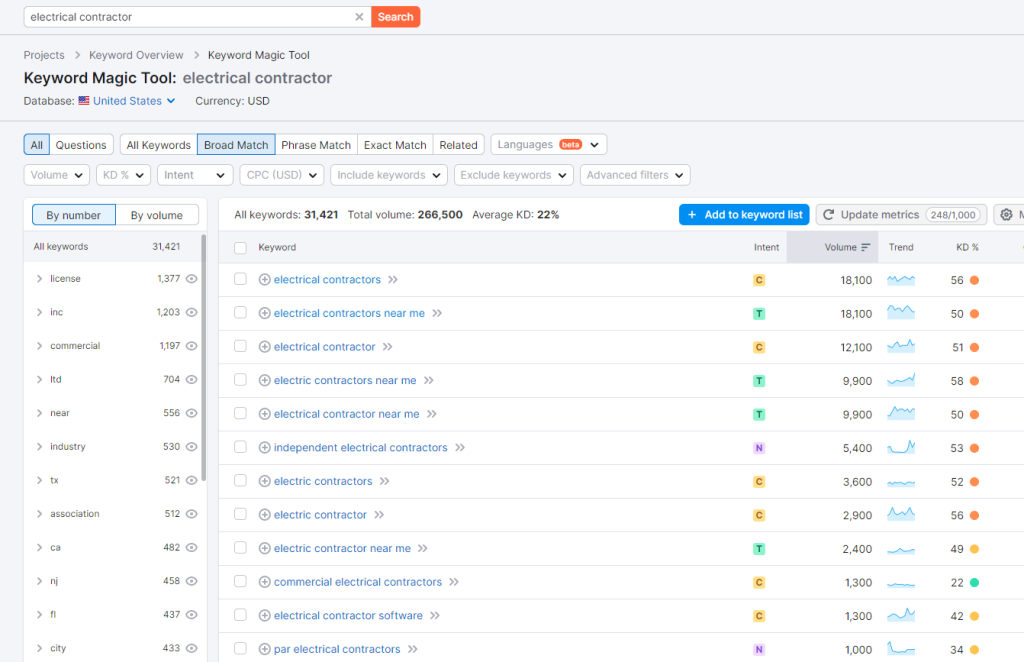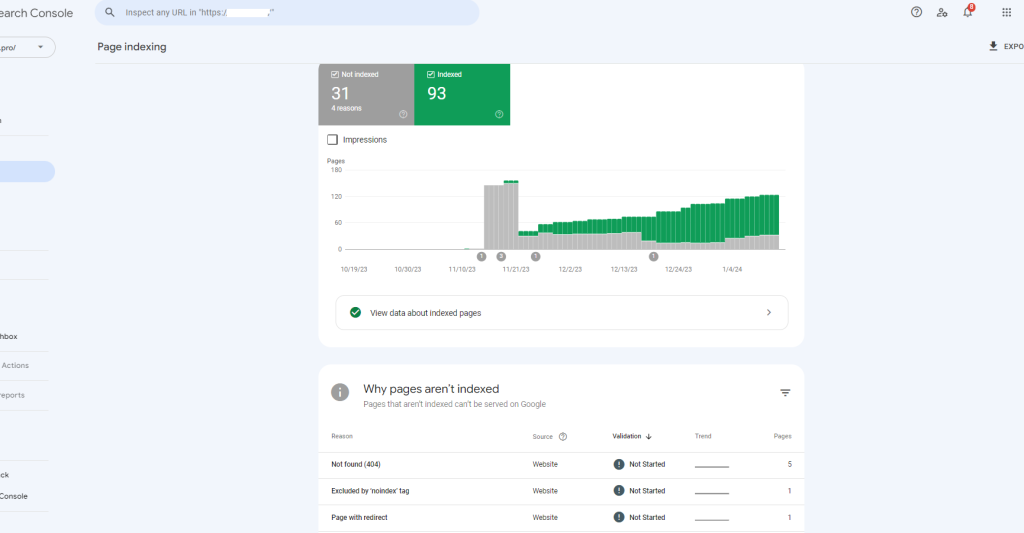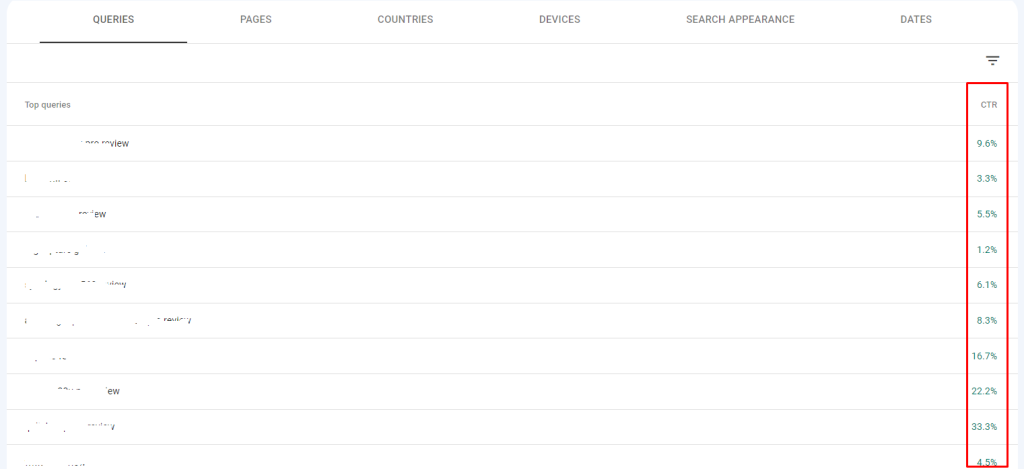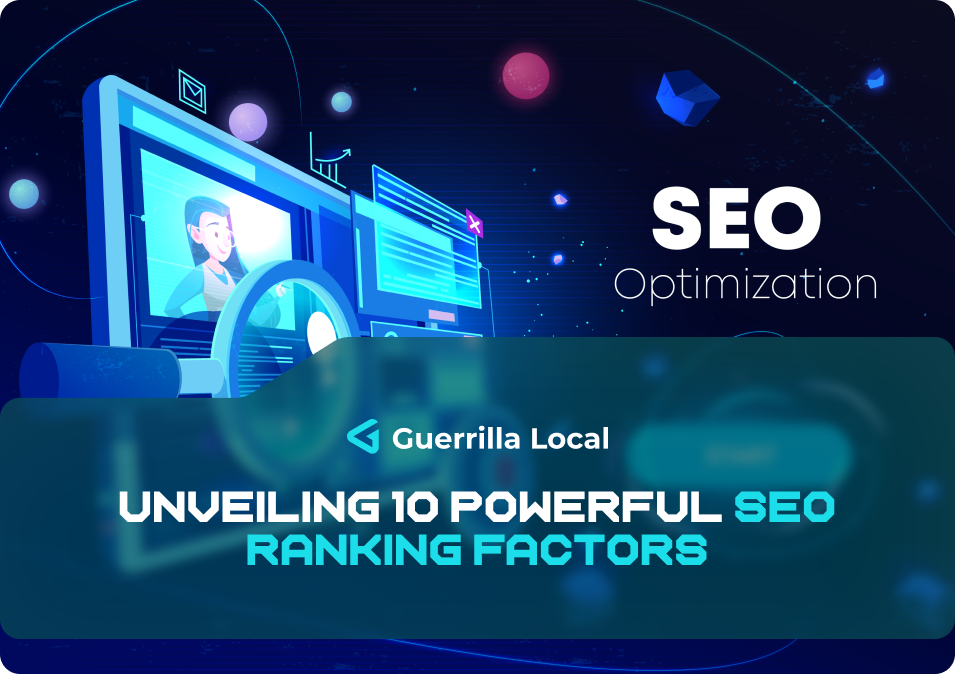Mastering the art of Search Engine Optimization (SEO) is crucial for businesses of all sizes and niches. Whether you’re a contractor trying to promote your services or a chiropractor looking to establish a prominent online presence, understanding and implementing the most important Google SEO ranking factors are paramount to success.
Table of Contents
1. Quality Content That’s Relevant to Search Queries
Keyword Research
At the heart of SEO lies the importance of quality content. Google places a premium on high-quality content that directly addresses user search intent. To produce valuable content, you must begin with thorough keyword research. Tools such as Google Search Console, SEMrush, and Ahrefs are invaluable in this endeavor.

Keyword research provides critical insights, including:
- Query: Understanding what phrases users enter into search engines.
- Search Volume: Gauging the popularity of specific queries.
- Difficulty: Assessing the competition for ranking on Google’s search results.
By leveraging keyword research, you can align your content with user search intent effectively. For instance, if you are an electrician and discover that users frequently search for “electrician near me” and “electrical contractor,” crafting content around these terms becomes essential to improve your rankings.
2. Crawlability and Indexability
Ensuring your website is easily crawlable and indexable by Google is fundamental. Without proper indexing, your website won’t attract organic search traffic. To enhance crawl ability and indexability, consider the following:

- Robots.txt: Confirm that your robots.txt file allows Google to crawl your website.
- Noindex Tags: Avoid using “noindex” tags on pages you want indexed.
- Canonical Tags: Implement “canonical” tags when necessary.
- Sitemap Submission: Submit your sitemap to Google.
- Internal Links: Incorporate internal links to facilitate navigation.
- URL Inspection Tool: Use Google Search Console’s URL Inspection tool to request page indexing.
3. Linking Structure
Backlinks
Link building, encompassing both internal and external links, is a pivotal factor influencing Google rankings. Your internal linking structure connects your web pages, creating a user-friendly site architecture. Likewise, external links, or backlinks, from reputable websites can bolster your website’s credibility and authority.
For instance, when a well-established home improvement website links to your “guide to roof installations,” it can boost your site’s credibility in Google’s eyes.
4. Content That Satisfies Search Intent
Satisfy Search Intent
Understanding user search intent is more than just identifying keywords; it’s about comprehending why users are searching. Google aims to deliver content that aligns with this intent. Factors Google uses to assess content relevance include:
- Bounce Rate
- Time on Site/Page
- Pages per Visit
- Goal Conversion Rate
To ensure your content meets user expectations, ensure it aligns with their needs and answers their queries effectively.
5. Duplicate Content is Bad
Duplicate Content
While drawing inspiration from high-performing content is legitimate, outright copying is discouraged. Google values unique content because it enhances the user’s search experience. Duplicate content can result in filtering by Google, hindering your page’s ranking. To avoid duplicate content issues:
- Create distinct content.
- Offer unique insights.
- Ensure your content differs from similar sources.
- Avoid using nearly identical content on multiple pages.
6. Experience, Expertise, Authoritativeness, and Trustworthiness (E-E-A-T)
E-E-A-T
Google’s evaluation of websites goes beyond content and extends to the creators themselves. This factor, known as E-E-A-T, plays a pivotal role in determining a website’s credibility.
- Experience: Google assesses the content creator’s relevant life experiences. For instance, if a medical website is authored by a licensed physician, it’s more likely to be considered authoritative in the medical field.
- Expertise: The level of knowledge and skills possessed by the content creator is crucial. Topics that require expertise, like legal advice or complex scientific subjects, demand content created by individuals with the necessary qualifications.
- Authoritativeness: Is the content creator recognized as an authority in their field? Websites authored by renowned experts often enjoy higher rankings due to their established reputation.
- Trustworthiness: Google evaluates the overall trustworthiness of the content creator, their content, and the website as a whole. Trust is built through accurate, reliable, and ethical content.
Demonstrating E-E-A-T can significantly boost your website’s credibility in Google’s eyes, ultimately leading to improved rankings.
7. Up-to-Date Content
Keeping Content Fresh
Content can become stale over time, potentially affecting your website’s rankings. Google values fresh and relevant content. When considering content updates, ask yourself the following questions:
- Publication Date: Has it been months or even years since the content was first published? Content that remains untouched for extended periods may be viewed as less valuable.
- Outdated Information: Does the content contain information that is no longer accurate or relevant? Keeping your content up-to-date ensures its continued usefulness to readers.
- External Links: Are external websites still linking to your page? A decline in external links may indicate that your content needs updating.
- Engagement Metrics: Is engagement on the page declining? Lower engagement rates may be a sign that your content requires a refresh to re-engage your audience.
To refresh your content effectively:
- Ensure it aligns with current search intent and user needs.
- Incorporate new and relevant topics or developments in your field.
- Remove outdated or irrelevant information that no longer adds value.
- Update the content with a clear revision date to signal its freshness to users and search engines alike.
8. Click-through Rate (CTR)
Enhancing Click-through Rates
While Click-through Rate (CTR) may not have a direct impact on search engine rankings, it carries several indirect benefits that can positively influence your website’s visibility and success. A higher CTR can result in:

- Increased Visibility: When more users click on your search results, it boosts your website’s overall visibility.
- Natural Backlinks: Higher traffic can lead to more backlinks from other websites, further establishing your website’s authority.
- Potential Leads: Increased clicks can translate into more potential leads for your business or website.
- Higher Engagement: A higher CTR often indicates that users find your content relevant and engaging, which can result in longer time spent on your site.
To improve your CTR:
- Craft compelling meta titles: Create engaging meta titles (the clickable headlines on search engine results pages) that entice users to click on them.
- Create engaging meta descriptions: Craft compelling meta descriptions (the summaries under the title tag) that align with the user’s search intent. Even though Google sometimes rewrites meta descriptions, creating effective ones is still crucial.
- Implement structured data for rich snippets: Rich Snippets are search results with additional data displayed. Structured data in your website’s code can enable these rich snippets, making your search results more appealing to users.
9. Website Speed
The Need for Speed
Page speed is a confirmed ranking factor, and it directly impacts user experience. A slow-loading website can deter visitors and hinder your rankings. To address this issue, consider the following strategies:
- Select a hosting solution designed for speed: Choose a web hosting provider known for its fast and reliable services.
- Use caching plugins: Implement caching plugins like WP Rocket to optimize your website’s performance.
- Leverage a Content Delivery Network (CDN): A CDN helps distribute your website’s content across multiple servers, reducing load times for users worldwide.
- Optimize image file sizes: Large image files can significantly slow down your website. Compress and optimize images to improve loading times.
10. Mobile Friendly
Mobile Optimization
Google places high importance on mobile-friendliness as a ranking factor. Given the increasing use of mobile devices for online browsing, ensuring your website functions seamlessly on smartphones and tablets is essential. Here are some tips for mobile optimization:
- Use a responsive layout and design: Ensure your website adapts to various screen sizes and orientations.
- Verify that fonts and graphics display properly on mobile devices: Content should be legible and visually appealing on smaller screens.
- Remove pop-ups and graphics that don’t fit well on mobile screens: A clutter-free mobile experience improves user satisfaction.
Optimizing for mobile devices is not only crucial for SEO but also for providing a positive user experience across all platforms.
Conclusion
Incorporating these essential Google ranking factors into your SEO strategy can significantly improve your website’s visibility, helping you outperform competitors and ultimately attracting more potential customers.
Remember, SEO is an ongoing process, and staying updated with the latest industry trends and Google algorithm changes is key to maintaining and improving your rankings. By consistently implementing these best practices, your contractor or roofing website can ascend the ranks and claim its place at the top of the search results.
FAQs
What are the ranking factors for SEO?
Ranking factors for SEO are elements or criteria that search engines use to determine the order in which websites appear in search results. They include factors like content quality, backlinks, website speed, and more
What increases SEO ranking?
SEO ranking can be improved by optimizing your website for factors like high-quality content, effective keyword usage, authoritative backlinks, mobile-friendliness, and providing a positive user experience.
How are SEO rankings calculated?
SEO rankings are calculated using complex algorithms that consider various factors, including the relevance of content to search queries, the number and quality of backlinks, user engagement, website speed, and more.
How many factors affect SEO?
SEO is influenced by numerous factors, but there are hundreds of known ranking factors. Some major ones include content quality, backlinks, user experience, mobile optimization, and technical SEO.
Do backlinks affect rankings?
Yes, backlinks play a significant role in SEO rankings. Quality backlinks from authoritative websites can improve your website’s authority and, in turn, its rankings in search results.
What is an SEO checklist?
An SEO checklist is a comprehensive list of tasks and best practices that website owners and SEO professionals follow to optimize a website for search engines. It helps ensure that all critical aspects of SEO are addressed.
How to master SEO in 2024?
To master SEO in 2024, stay updated with industry trends, focus on quality content creation, optimize for mobile and voice search, build authoritative backlinks, and use data analytics to make informed decisions.
How to rank number 1 in SEO?
Achieving the top ranking in SEO requires a multifaceted approach. This includes targeting the right keywords, creating high-quality content, optimizing technical SEO, acquiring authoritative backlinks, and continuously monitoring and improving your website’s performance. It’s a competitive and ongoing process.






